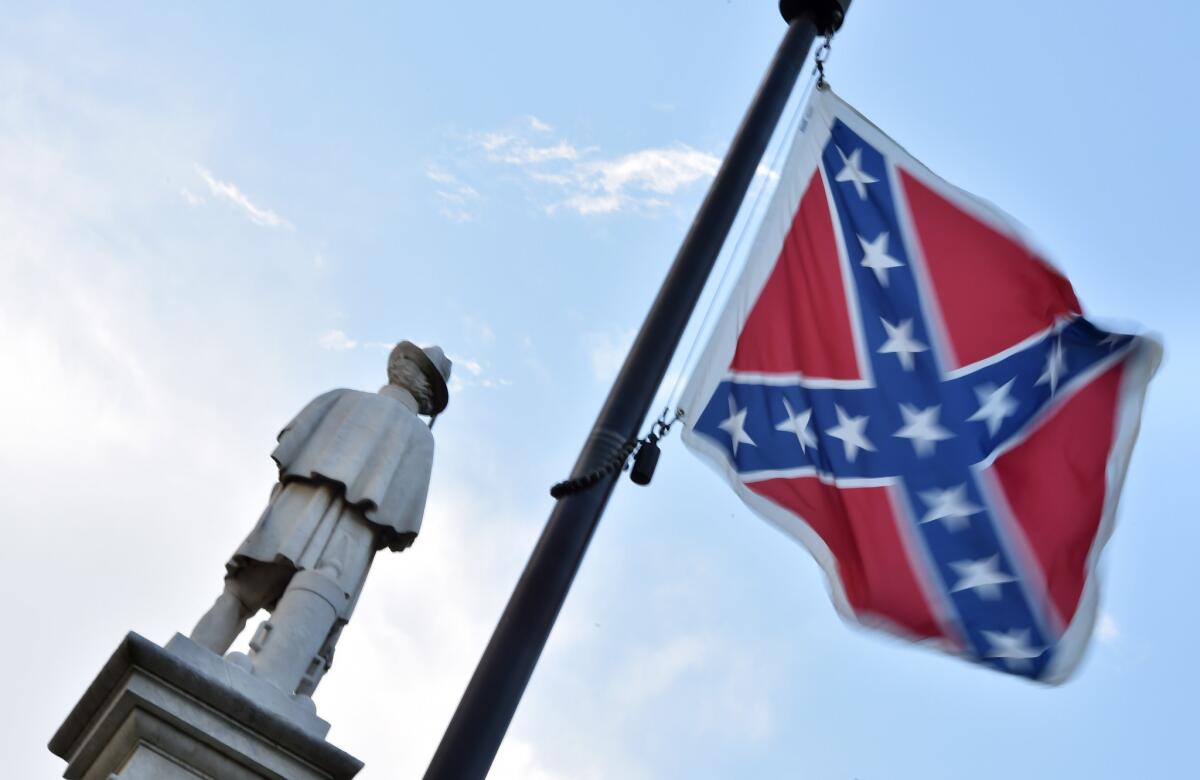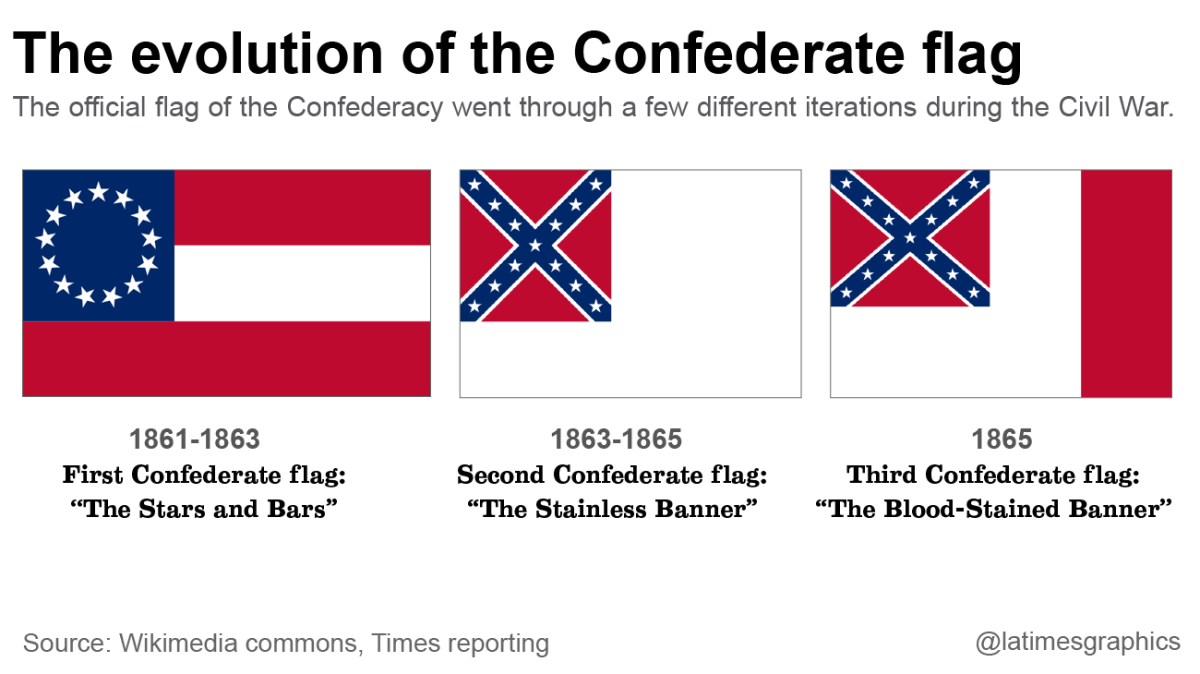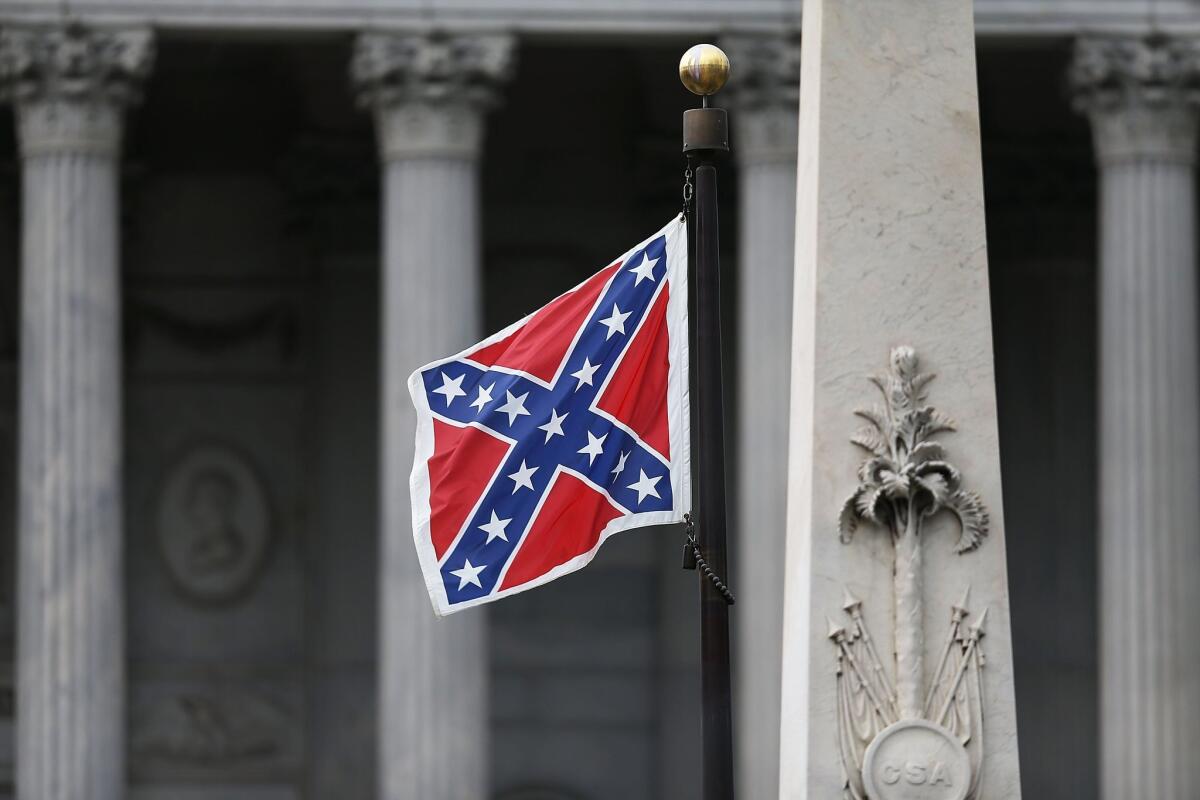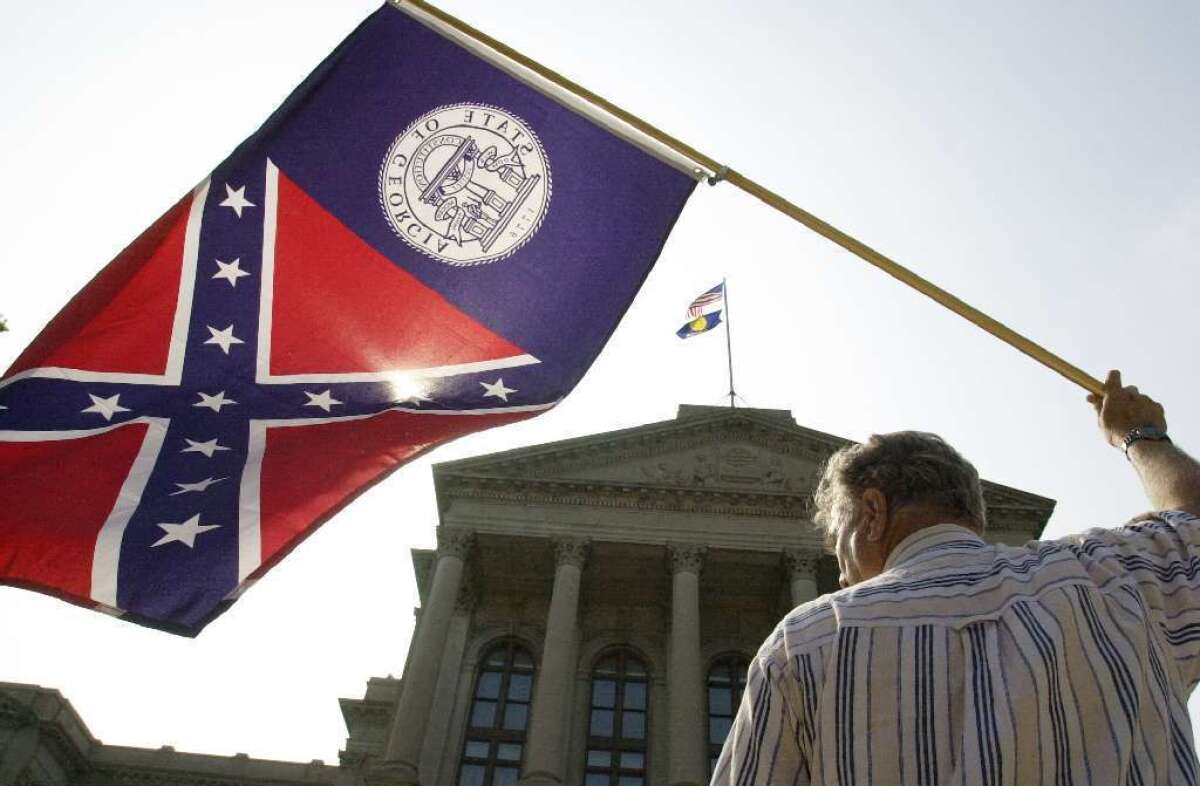The Confederate flag: Where it flies, where it’s coming down and why it’s still used

The Confederate flag flies near the South Carolina Statehouse in Columbia.
A strong push to remove the Confederate battle flag from Capitol grounds in South Carolina and Alabama — as well as the shelves of major retailers — was sparked by the racially motivated killings of nine people inside a historic black church last week.
Long a controversial symbol, the flag can be seen in photos of the accused shooter, Dylann Roof. Roof, 21, used a "Stars and Bars" license plate holder on his car and can be seen waving the battle flag in other shots. Roof's apparent embrace of the flag has energized its opponents and caused some politicians to rethink their previous support for its use.
Over the years, the Confederate battle flag has come to mean different things to different people in politics and pop culture. To many, it is emblematic of slavery, racism and the bloody battles that made the Civil War the deadliest conflict in U.S. history. But supporters of the flag say they see it as a memorial to slain Confederate soldiers.
Here's a look at the history of the battle flag and the latest developments in its use.
The flag's origins
The symbol comes from a square battle flag flown by Gen. Robert E. Lee's Army of Northern Virginia during the Civil War. It was never an official banner of the Confederacy, but it grew so popular as the war progressed, it was incorporated into versions of the whole movement's flag.

The latest on South Carolina's flag

The Confederate flag flies on the Capitol grounds in Charleston, S.C. after Gov. Nikki Haley announced on June 22 that she will call for it to be removed.
The Confederate battle flag flying on the Capitol grounds in Charleston, S.C. (Joe Raedle / Getty Images)
The Confederate battle flag that waves near South Carolina's statehouse once flew over the state's Capitol building, part of a larger rebuke by several Southern states of the 1960s Civil Rights movement. In the years that followed, most of those state governments stopped raising the flag. South Carolina held out, though — the battle flag flew over that state Capitol's dome until 2000, when it was moved to its current location.
South Carolina Gov. Nikki Haley called Monday for the flag to be taken down from the Capitol grounds, and the state Legislature agreed Tuesday to debate the idea. There's a high bar to clear: Removing the flag or even putting it at half-staff is not permitted without approval from two-thirds of the Legislature.
Haley's call for change came days before the body of state Sen. Clementa Pinckney, the pastor of the church where the shooting took place, was scheduled to lie in state at the Capitol. Pinckney's body arrived Wednesday with the battle flag still flying.
A symbol of hate or pride?
Former Ku Klux Klan leader David Duke speaks to supporters at a 2004 reception in Louisiana with a Confederate battle flag hanging in the background. (Burt Steel / Associated Press)
The Confederate battle flag is an icon in "every sector of the hate movement," including the Ku Klux Klan and neo-Nazi groups, according to Heidi Beirich, head of the Intelligence Project for the Southern Poverty Law Center.
But while the flag is commonly associated with extremism, it has appeared on merchandise and album covers of popular rock acts, including Kid Rock, Tom Petty and Ted Nugent. Among Southern rock acts, Lynyrd Skynyrd was one of the most prominent champions of the battle flag, but the band since has distanced itself from the symbol. In 2012, a member said the band would stop using the flag as a stage decoration.
Beirich, who moved to Alabama in 1999, told the Los Angeles Times that the flag's popularity has greatly declined in recent years. "When I came to Alabama, you would see these flags all over the place. And that has been less and less," she said. "You mostly see it now in the backwoods areas in Southern states or on Confederate memorials."
Last week's deadly shooting at the Charleston church "sort of put a face on that flag now that makes it really ugly," Beirich continued. The man charged in the attack had boasted of racist beliefs and posed in photographs with Confederate flags and symbols.
Where else does the flag fly on government property?

A man waives Georgia’s former state flag, which ceased to be the state’s official banner after the state legislature passed a measure banning the old design, which bears the Confederate cross.
Georgia's state flag used to contain the Confederate battle emblem, but it was changed in 2001. (Associated Press)
South Carolina is not alone in flying an image of the battle flag on state grounds, and it's not the only state experiencing a push to remove the image from state grounds either.
Alabama Gov. Robert Bentley ordered four Confederate flags to be taken down on the state Capitol grounds Wednesday morning, a spokeswoman confirmed. The flags had flown at a memorial honoring Confederate soldiers, and they will be removed permanently, said Yasamie August. Until 1993, Alabama had flown the Confederate flag atop the state Capitol.
Mississippi's state flag is dominated by an image of the rebel cross. In 2001, voters there chose to keep the design as is. But on Monday, Republican House Speaker Philip Gunn issued a statement saying the time has come to change the state's flag, which has been emblazoned with the cross since 1894. U.S. Sen. Roger Wicker (R-Miss.), a descendant of Confederate soldiers, joined in Wednesday, announcing that he now believes the state flag should be “replaced by one that is more unifying to all Mississippians.” U.S. Rep. Bennie Thompson (D-Miss.) introduced a resolution that would remove the Mississippi state flag from the House side of the U.S. Capitol and any House office building. The resolution was sent to the Committee on House Administration for consideration.
U.S. Sen. Thad Cochran (R-Miss.) also said Wednesday he hoped state officials would consider a change to the flag. "We should look for unity and not divisiveness in the symbols of our state," he said in a brief statement.
And after the Supreme Court ruled last week that Texas authorities were justified in refusing to issue a specialty license plate bearing the image of a Confederate battle flag, the governors of Virginia, Maryland and North Carolina moved this week to have their states stop offering license plates that depict the flag.
These are the latest in a series of decisions that have seen the flag's prominence decline in the last 20 years. Georgia's state Legislature voted in 2003 to completely remove any references to the battle flag from its state banner.
Georgia lawmakers previously had voted to greatly reduce the rebel cross' presence on the state flag in 2001, changing the state banner for the first time since 1956.
Effects on the campaign trail

GOP presidential candidates Jeb Bush, left, and Marco Rubio both have had to deal with issues surrounding the Confederate flag during their tenures as public servants in Florida.
Jeb Bush, left, and Marco Rubio (File photos)
The Confederate banner has become a hot topic among politicians vying for the Republican presidential nomination.
Former Florida Gov. Jeb Bush and Sen. Marco Rubio, two of the favorites in a crowded GOP field, both said the flag in South Carolina should go but softened their remarks by saying state lawmakers should make the decision on their own.
Mitt Romney, the 2012 Republican nominee, said Saturday that the flag should be removed. His sentiments were quickly echoed by Sen. Lindsey Graham (R- S.C.), who is a candidate in the 2016 field, and by the head of the Republican National Committee.
Retailers yank products
As public backlash against the Confederate battle flag intensifies, several major U.S. companies, including Wal-Mart, Target, Sears and EBay, have decided to stop selling items bearing the flag's image.
Apple is removing apps from the iTunes store that “use the Confederate flag in offensive or mean-spirited ways, which is in violation of our guidelines," the company said Thursday in a statement. "We are not removing apps that display the Confederate flag for educational or historical uses.”
The National Park Service is removing Confederate flag sales items from national park bookstores and gift shops. “We strive to tell the complete story of America,” National Park Service Director Jonathan B. Jarvis said in a statement. “All sales items in parks are evaluated based on educational value and their connection to the park. Any stand-alone depictions of Confederate flags have no place in park stores.”
Times staff writers Christine Mai-Duc, Ryan Parker, David G. Savage and Kyle Kim contributed to this report.
Follow @JamesQueallyLAT for breaking news
ALSO:
Full Coverage: Confederate flag controversy
What you should know about the Confederate flag’s evolution
Time for Confederate flag devotees to surrender
Jeb Bush, Marco Rubio are no strangers to Confederate flag debate
UPDATES:
June 25, 5:10 p.m.: This story has been updated with information about the Mississippi state flag and information about the sale of Confederate flags.
June 24, 12:28 p.m. This post updated with comments from U.S. Sen. Thad Cochran.
The first version of this post was published June 24 at 11:50 a.m.
Sign up for Essential California
The most important California stories and recommendations in your inbox every morning.
You may occasionally receive promotional content from the Los Angeles Times.








